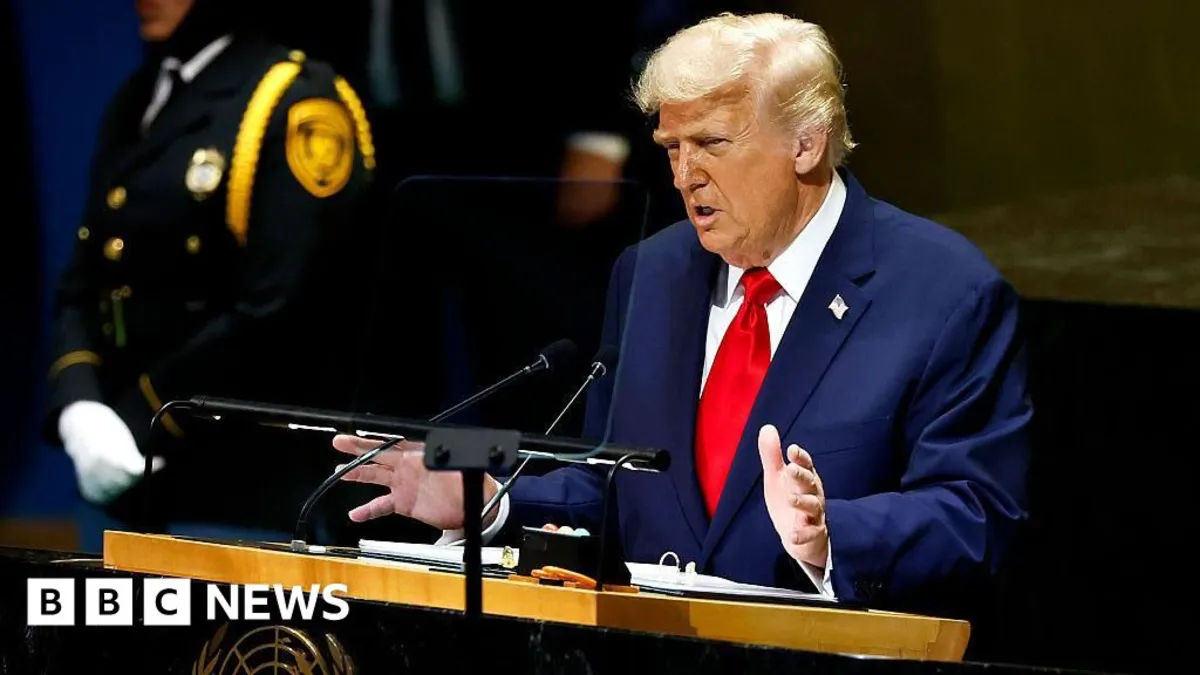
In a recent statement, former President Donald Trump referred to Russia as a 'paper tiger' that has been waging an aimless war in Ukraine. His comments are likely to have stirred emotions within the Kremlin, reminiscent of past remarks made by other global leaders that have been perceived as insults. For instance, President Barack Obama's description of Russia as merely a regional power rather than a global force was taken as a significant affront by Moscow.
Trump's assertion that Ukraine could potentially reclaim all the territory seized by Russia has also raised eyebrows among Russian officials. This perspective, combined with Trump's affirmative response to a reporter's question regarding whether NATO countries should shoot down Russian aircraft that enter their airspace, adds more fuel to the fire of diplomatic tension. "Yes, I do," Trump answered, indicating a willingness to escalate the situation.
Despite the potential for outrage, the Kremlin's initial response has been remarkably restrained. Dmitry Peskov, spokesperson for President Vladimir Putin, downplayed the 'paper tiger' comment, asserting, "Russia is in no way a tiger; it's more associated with a bear. There is no such thing as a paper bear." This reflects a calculated effort by Moscow to maintain composure amid provocative statements.
When addressing the possibility of Ukraine regaining lost territory, Peskov stated, "The assertion that Ukraine can win back something by fighting is mistaken." This response was delivered during a conference call for journalists, where Peskov also acknowledged Trump's political will to work towards a peace settlement, showcasing a diplomatic tone.
It is important to note that the Kremlin often adopts a calm demeanor in response to Trump's unexpected criticisms. According to the Russian newspaper Izvestiya, Trump is easily influenced by the last person he speaks to—in this case, Ukrainian President Volodymyr Zelensky. This suggests that Moscow believes Trump's views on Ukraine are not fixed and that he can be swayed to align more closely with Russian perspectives.
Peskov further indicated that there would be opportunities for Russian representatives to communicate their positions to the U.S. side, particularly during upcoming meetings between Russian Foreign Minister Sergei Lavrov and U.S. Secretary of State Marco Rubio at the United Nations General Assembly.
Another reason behind Russia's restrained reaction is that Trump's remarks, while critical, did not include any threats of further sanctions or ultimatums for peace. The Kremlin likely noted this absence of direct confrontation as a signal of reduced immediacy in the geopolitical landscape.
When asked if he still trusted Putin, Trump's ambiguous response—"I'll let you know in about a month from now"—is unlikely to induce significant anxiety within the Kremlin. A month can be a long time in the context of war and international relations, but it does not pose an immediate threat.
In his comments, Trump also painted a bleak picture of the Russian economy, which the Kremlin promptly denied. While it's true that Russia's economy is not collapsing, it is facing considerable strain. More than three years of international sanctions and substantial military spending have led to a growing budget deficit and declining revenues from oil and gas.
Reports indicate that various industries are struggling, compounded by recent Ukrainian drone attacks on Russian oil refineries, which have disrupted domestic fuel supplies. Russian newspapers have recently reported petrol shortages in various regions, with tabloid Moskovsky Komsomolets labeling the situation as a full-scale fuel crisis.
Despite these economic pressures, there are no indications that they are affecting Russia's military calculations. In fact, the Russian finance ministry has proposed increasing the value-added tax (VAT) from 20% to 22% to help balance the state budget, primarily for financing defense and security initiatives.
At this juncture, President Vladimir Putin appears resolute in his commitment to continue the war in Ukraine, regardless of Trump's remarks or the economic challenges faced by Russia. As the conflict persists, the interplay between U.S. and Russian narratives will be critical in shaping future diplomatic engagements and military strategies.